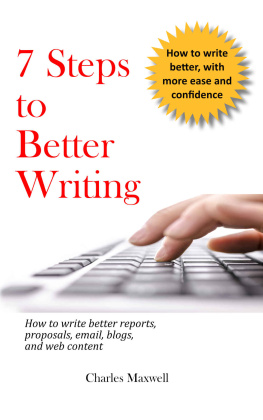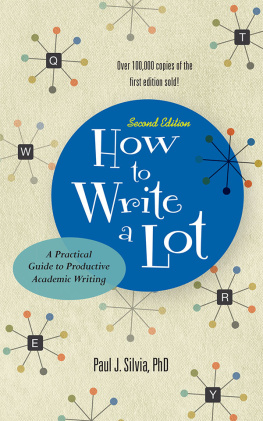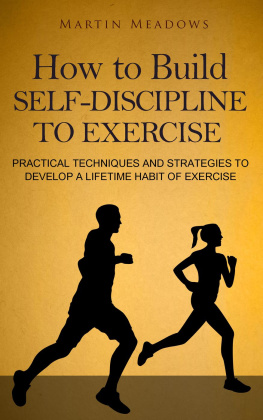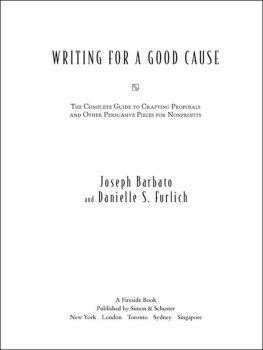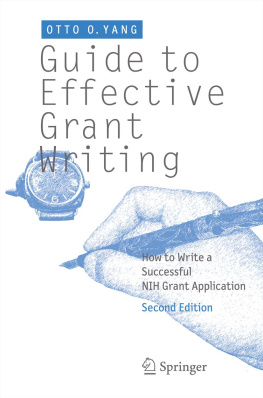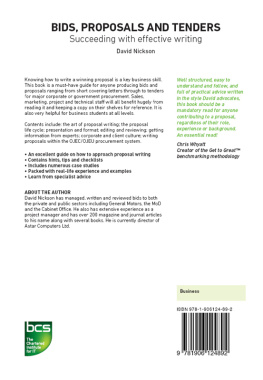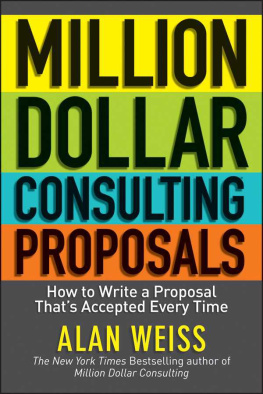Schimel - Writing science: how to write papers that get cited and proposals that get funded
Here you can read online Schimel - Writing science: how to write papers that get cited and proposals that get funded full text of the book (entire story) in english for free. Download pdf and epub, get meaning, cover and reviews about this ebook. City: Oxford, year: 2012, publisher: Oxford University Press USA - OSO, genre: Romance novel. Description of the work, (preface) as well as reviews are available. Best literature library LitArk.com created for fans of good reading and offers a wide selection of genres:
Romance novel
Science fiction
Adventure
Detective
Science
History
Home and family
Prose
Art
Politics
Computer
Non-fiction
Religion
Business
Children
Humor
Choose a favorite category and find really read worthwhile books. Enjoy immersion in the world of imagination, feel the emotions of the characters or learn something new for yourself, make an fascinating discovery.

- Book:Writing science: how to write papers that get cited and proposals that get funded
- Author:
- Publisher:Oxford University Press USA - OSO
- Genre:
- Year:2012
- City:Oxford
- Rating:5 / 5
- Favourites:Add to favourites
- Your mark:
- 100
- 1
- 2
- 3
- 4
- 5
Writing science: how to write papers that get cited and proposals that get funded: summary, description and annotation
We offer to read an annotation, description, summary or preface (depends on what the author of the book "Writing science: how to write papers that get cited and proposals that get funded" wrote himself). If you haven't found the necessary information about the book — write in the comments, we will try to find it.
Schimel: author's other books
Who wrote Writing science: how to write papers that get cited and proposals that get funded? Find out the surname, the name of the author of the book and a list of all author's works by series.
Writing science: how to write papers that get cited and proposals that get funded — read online for free the complete book (whole text) full work
Below is the text of the book, divided by pages. System saving the place of the last page read, allows you to conveniently read the book "Writing science: how to write papers that get cited and proposals that get funded" online for free, without having to search again every time where you left off. Put a bookmark, and you can go to the page where you finished reading at any time.
Font size:
Interval:
Bookmark:
Writing Science
How to Write Papers That Get Cited and Proposals That Get Funded
JOSHUA SCHIMEL


Oxford University Press, Inc., publishes works that further
Oxford Universitys objective of excellence
in research, scholarship, and education.
Oxford New York
Auckland Cape Town Dar es Salaam Hong Kong Karachi
Kuala Lumpur Madrid Melbourne Mexico City Nairobi
New Delhi Shanghai Taipei Toronto
With offices in
Argentina Austria Brazil Chile Czech Republic France Greece
Guatemala Hungary Italy Japan Poland Portugal Singapore
South Korea Switzerland Thailand Turkey Ukraine Vietnam
Copyright 2012 by Oxford University Press
Published by Oxford University Press, Inc.
198 Madison Avenue, New York, New York 10016
www.oup.com
Oxford is a registered trademark of Oxford University Press
All rights reserved. No part of this publication may be reproduced, stored in a retrieval system, or transmitted, in any form or by any means, electronic, mechanical, photocopying, recording, or otherwise, without the prior permission of Oxford University Press.
Library of Congress Cataloging-in-Publication Data
Schimel, Joshua.
Writing science : how to write papers that get cited and proposals that get funded / Joshua Schimel.
p. cm.
Includes bibliographical references and index.
ISBN 978-0-19-976023-7 (hardcover : alk. paper) ISBN 978-0-19-976024-4 (pbk. : alk. paper)
1. Technical writing. 2. Proposal writing for grants. I. Title.
T11.S35 2012
808.0665dc23
2011028465
1 3 5 7 9 8 6 4 2
Printed in the United States of America on acid-free paper
To my father, Jack Schimel, who loved language
Those who can do, also teach.
It came as a surprise to me one day to discover that I was writing a book on writing. Its not the normal pastime for a working scientist, which I amIm a professor of soil microbiology and ecosystem ecology. I write proposals, I write papers, and I train students to do both. I review extensively and have served as editor for several leading journals. Teaching writing evolved from those activities, and it became a hobby and a passion. This book is the outgrowthits what I have been doing when I should have been writing papers.
Although I believe I have become a good writer, I got there through hard work and hard lessons. I didnt start out my academic life that way. Before teaching my graduate class on writing science for the first time, I went back to my doctoral dissertation for a calibration checkwhat should I expect from students? I made it through . At that point, my tolerance for my own writing hit bottom and my appreciation for my advisors patience hit top. Even the papers those clumsy chapters morphed into were only competent.
My writing has improved because I worked on becoming a writer. That doesnt mean just writing a lot. You can do something for many years without becoming competent. Case in point: the contractor who put a sunroom on our house. He kept insisting, Ive been doing this for 20 years and know what Im doing; the building inspectors report, however, said to reframe according to building codes and standard building practices.
I have learned to write through a number of avenues: guidance from my mentors; the trial and error of reviews and rejections; thinking about communication strategy; working with students on their papers; reviewing and editing hundreds of manuscripts; reading and rereading books on writing; and importantly, participating in my wifes experiences as a developing writer, listening to the lessons from her classes, and watching how real writers train and develop. I have tried to meld all these lessons into science writing, incorporating writers perspectives into the traditions and formulas of science. This book represents that amalgamation, and I hope it will help you short-circuit the long, slow, struggle I experienced.
Many books on writing (notably the bad ones) present a long string of rules for how to write well. In them, writing is formulaic. In good writing, however, the code is more what you call guidelines than actual rules (to quote from Pirates of the Caribbean), a point made strongly by two prominent writers on writing, Joseph Williams (Style: Toward Clarity and Grace) and Roy Peter Clark (The Glamour of Grammar). Most of the time, following the rules will improve your writing, but good writers break them when it serves their purposes. I distinguish such rules from principles, which are the general concepts that guide successful communication. If you violate principles, your writing will suffer.
Throughout the book I try to distinguish between rules and principles, and I hope to offer enough insight that you will understand which are which, and why. When following a rule conflicts with following a principle, flout the rule freely and joyously.
I found examples in many placessome from work I know, some from papers that friends recommended, one from someone I met on an airplane, and many from randomly flipping through journals. The examples I hold up as good practice, I use intact and cite properly, though I remove the reference citations to make them easier to read. Exemplars of good practice deserve to be recognized. I sometimes point out what I see as imperfections, but only to highlight that even good writing can usually be better, and that although we may strive for perfection, we never reach it. A good enough proposal may still get funded, and an award letter from the National Science Foundation is the best review Ive ever seen.
The examples of what I think you should not do are closely modeled on real examples. However, unless they come from my own work, I have rewritten the text to mask the source. When I rewrote the text, I maintained the structural problems so that even if the science is no longer real, the writing is. In some cases these examples are from published work; in others, from early drafts that were revised and polished before publication. If you recognize your own writing or my comments on it (if I had handled it as a reviewer or editor), please accept my thanks for stimulating ideas that I could use to help future writers. We learn from our mistakes, and I need to show readers real mistakes to learn from. I hope I helped with the reviews I wrote at the time.
When I take examples from my own work, it is because only then can I accurately explain the authors thinking. When I use others work, I can assess what they did and why it worked or failed, but I cant know why they made the choices they did. For proposals, I use my own extensively because I have access to them. Proposals arent published, so I cant scan other fields to find good examples, as I could for papers.
I have included examples from many scientific disciplines to illustrate that my approaches and perspectives are broad-based; the basic challenges and strategies of writing are similar across fields. Many, however, come from the environmental sciences, where I knew where to find useful examples and where I felt that most readers would be able to understand enough of the content to have an easier time focusing on the writing.
In most chapters, I include exercises to apply the concepts I discuss. I encourage you to work through these, ideally in small groups. Writers often have writers groups, where typically four to six people get together to work over each others material, discuss what works and what doesnt, and suggest alternative ways of doing things. This process is helpful in developing successful writersit provides insights from different points of view that can stretch boundaries and offer new ideas. Analyzing others work can hone analytical skills. Groups also provide a supportive environment for learning, analogous to how a lab group helps you expand your research tools.
Next pageFont size:
Interval:
Bookmark:
Similar books «Writing science: how to write papers that get cited and proposals that get funded»
Look at similar books to Writing science: how to write papers that get cited and proposals that get funded. We have selected literature similar in name and meaning in the hope of providing readers with more options to find new, interesting, not yet read works.
Discussion, reviews of the book Writing science: how to write papers that get cited and proposals that get funded and just readers' own opinions. Leave your comments, write what you think about the work, its meaning or the main characters. Specify what exactly you liked and what you didn't like, and why you think so.

